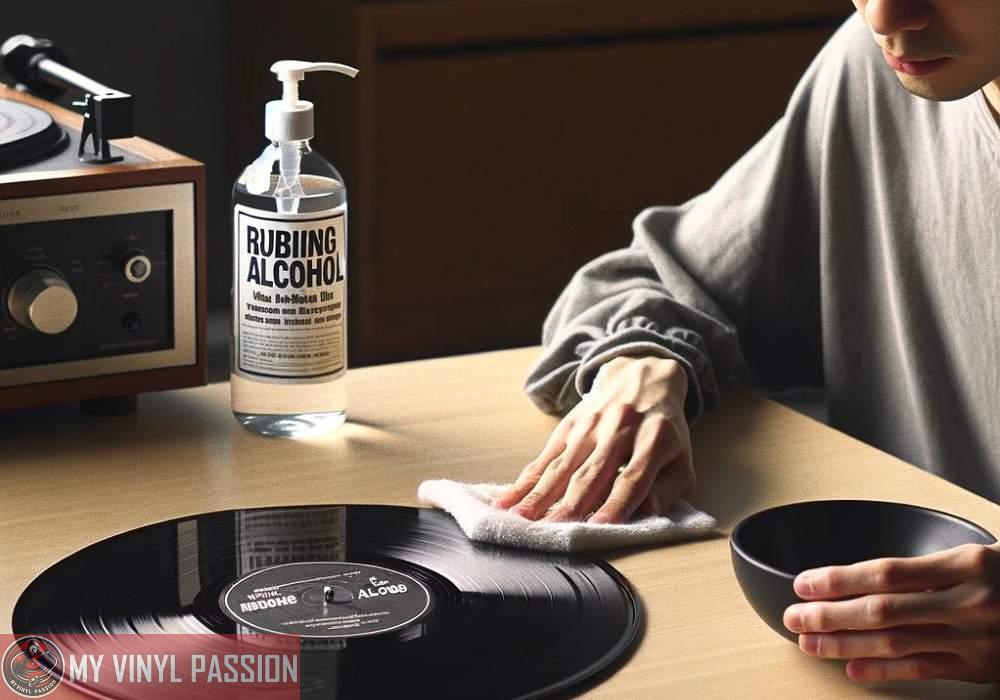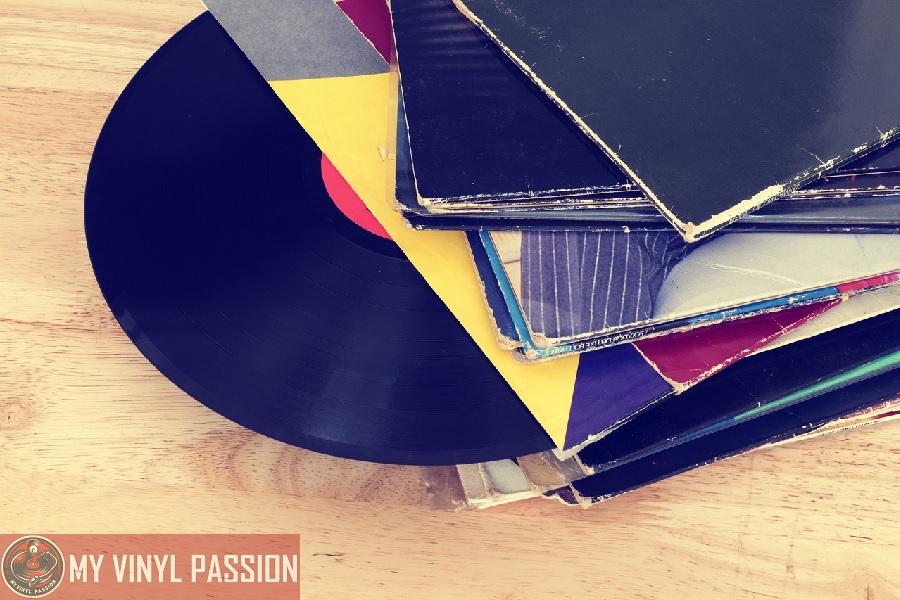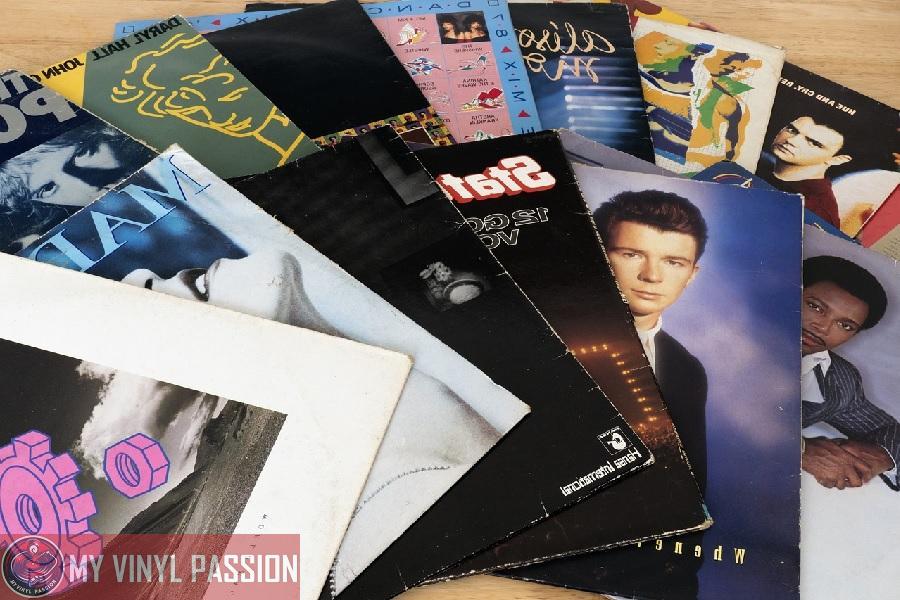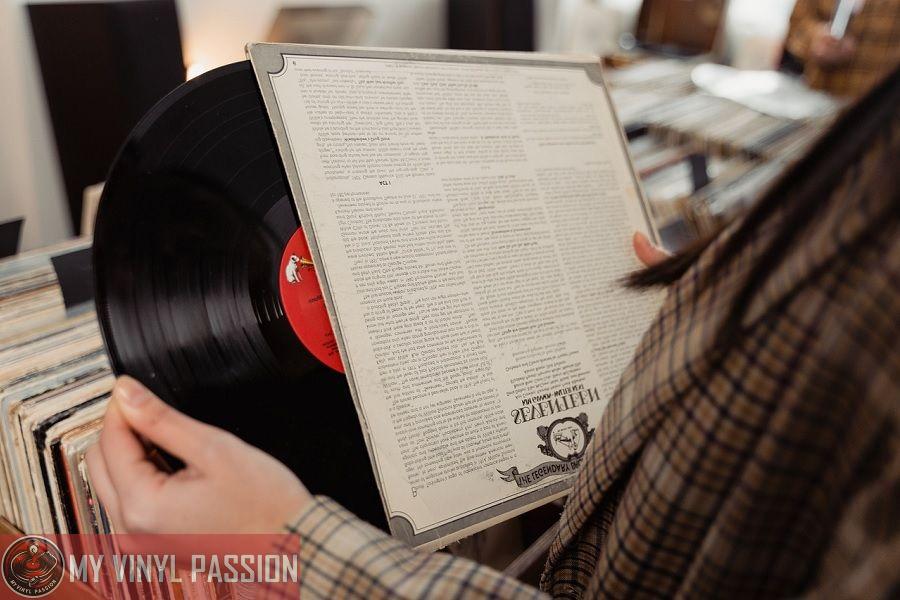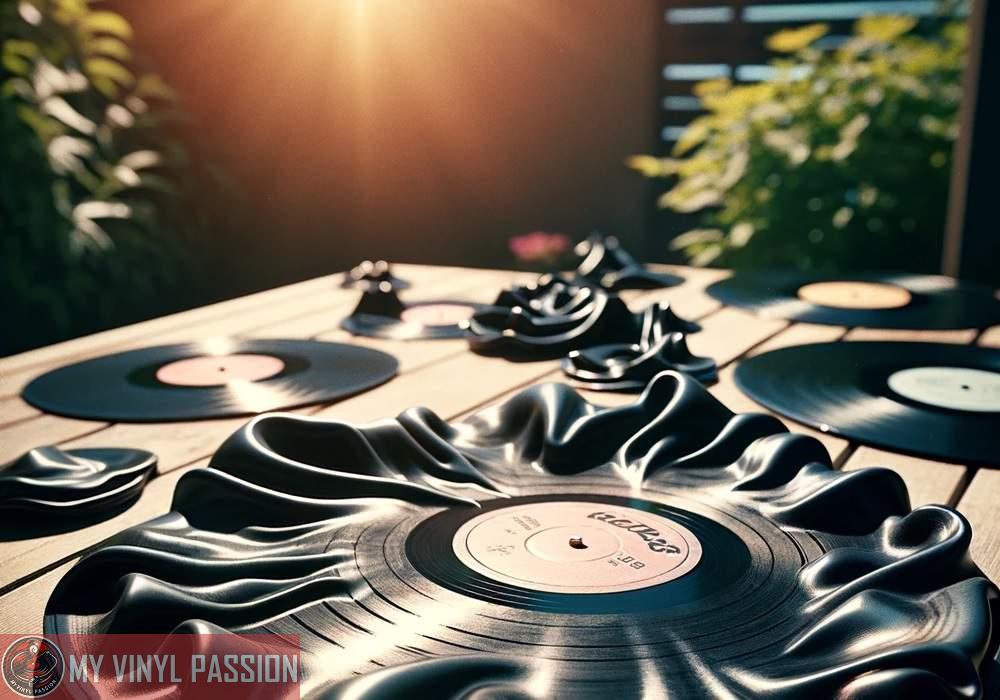When it comes to maintaining the quality of vinyl records, cleanliness is a must.
We often stumble upon various methods and solutions touted to effectively clean these delicate grooves, effectively removing dust, debris, and oily fingerprints.
Among these methods, there’s a common household item that frequently comes up in conversation: rubbing alcohol.
Questions about its safety and effectiveness are common, as record enthusiasts are aware that the wrong cleaning technique can cause irreversible damage to their treasured collection.
In Summary
Vinyl records, made of polyvinyl chloride (PVC), are sensitive to certain chemicals, and inappropriate cleaning substances can degrade the grooves that encode the music.
Rubbing alcohol is often considered for cleaning vinyl due to its disinfectant properties, but there are concerns about its interaction with the PVC material of the records.
To safely clean vinyl records, it’s advised to use a gentle brush for surface dust and a specialized vinyl cleaning solution rather than household cleaners like rubbing alcohol, which can harm the vinyl.
It’s important to address why some collectors might consider using rubbing alcohol. The substance’s effectiveness in cleaning and its disinfectant properties make it an attractive option.
Yet, when we look at the chemical composition of vinyl records and the potential reactions they can have with various substances, we have to exercise caution.
Vinyl is susceptible to certain chemicals, which can lead to the degradation of the grooves that hold the music.
Efficiency in cleaning must be balanced with a need to preserve.
We understand how tempting it is to reach for that bottle of rubbing alcohol—it’s readily available and known for its cleaning prowess. Before we take that route, we must consider the material science of vinyl records and the long-term effects of our chosen cleaning agents.
Understanding Vinyl Records
Vinyl records are a medium of sound recording that emerged in the early 20th century and have seen a resurgence in popularity. These records are made of polyvinyl chloride (PVC) and are known for their analog sound quality, which some listeners prefer over digital formats.
When handling our records, we need to be aware of the material properties:
- Durability: Vinyl is more delicate than digital mediums and can be easily scratched or warped if not handled correctly.
- Sensitivity: They react negatively to heat, direct sunlight, and inadequate storage.
The anatomy of a vinyl record includes:
- Grooves: Tiny grooves in the vinyl contain the music. The depth and movement of these grooves correspond to the sound waves of the music.
- Label: The center part that typically displays the artist and album information.
- Edge: The perimeter of the record that is gripped to prevent contact with the grooves.
When caring for our vinyl records, we must adhere to proper maintenance routines, involving:
- Correct storage
- Vertical positioning
- Away from heat sources
- Regular cleaning
- Using proper solutions and materials
In cleaning our records, it’s critical to use substances that won’t harm the material. While isopropyl alcohol is commonly used for its cleaning properties, its suitability for vinyl records is debated due to its potential to damage the grooves and strip away necessary oils.
Hence, caution should be exercised, and alternative methods should be explored.
Basics of Vinyl Cleaning
When it comes to maintaining the quality and longevity of vinyl records, proper cleaning is essential. We understand the importance of using the right materials to avoid damage.
It’s crucial to start with a gentle brush designed specifically for vinyl to remove surface dust. Daily dusting can significantly reduce the accumulation of debris that might create pops and crackles during playback.
For a more thorough clean, a solution specifically made for vinyl records should be applied. It’s important to note that common household cleaners, such as isopropyl alcohol or rubbing alcohol, can be harmful. These substances, often considered safe for other uses, can cause deterioration to the vinyl’s protective coating, leading to permanent audio degradation.
Here’s a quick reference for materials suitable for cleaning vinyl records:
- Soft antistatic brush: For daily dusting.
- Specialized vinyl cleaning solution: For deep cleaning.
- Microfiber cloth: To dry and remove any remaining solution.
- Stylus brush: To keep the needle clean and ensure accurate tracking.
In our cleaning process, we always start with dusting, then apply the cleaning solution sparingly to the record surface, avoiding the label.
Gently wiping in a circular motion along the grooves with a microfiber cloth helps to lift any residual grime. With these steps, we can help ensure that our vinyl records will continue to sound as intended for years to come.
Chemical Composition of Rubbing Alcohol
Rubbing alcohol is a common household disinfectant consisting primarily of isopropyl alcohol (IPA) or ethanol. We find that these alcohols typically make up 70% to 99% of the rubbing alcohol solution. The concentration can vary based on the intended use. For example:
- 70% IPA is commonly used for disinfection.
- 91% IPA has applications in industrial settings.
- 99% IPA is used in certain laboratory procedures.
The remainder of the solution often includes distilled water to dilute the alcohol, making it safer for household use. Water is a critical component because it enhances the alcohol’s efficacy against microbial organisms.
Another ingredient found in rubbing alcohol is denatonium benzoate, which is a bittering agent added to discourage ingestion. This is especially important given the potentially harmful effects of isopropyl alcohol if consumed.
Here’s a breakdown of typical rubbing alcohol composition:
| Ingredient | Purpose | % |
|---|---|---|
| Isopropyl Alcohol | Primary disinfectant and solvent | 70-99 |
| Water | It dilutes and enhances efficacy | Variable |
| Denatonium Benzoate | Bittering agent to prevent ingestion | <0.1 |
Some formulations may also include colorants or fragrances, but this is less common in the standard variants. It’s essential to use rubbing alcohol according to its labeling instructions to ensure safety and effectiveness.
Potential Risks of Using Rubbing Alcohol
When we consider using rubbing alcohol to clean vinyl records, there are several risks to be aware of. The composition of rubbing alcohol, typically isopropyl or ethyl alcohol, can be particularly harmful to vinyl records.
- Chemical Reaction: Rubbing alcohol may cause a chemical reaction with the vinyl, leading to a breakdown of the record’s material.
- Surface Damage: It can strip away the record’s protective coating, increasing the risk of scratches and long-term damage.
The vinyl surface is also prone to becoming cloudy or foggy when exposed to strong solvents like alcohol. This can result in a loss of audio fidelity and a diminished aesthetic appearance.
Quick Facts:
| Risk Factor | Description | Consequence |
|---|---|---|
| Chemical Compatibility | Alcohol’s solvent nature | Deterioration of vinyl |
| Protective Coating | Removal of coating by alcohol | Increased vulnerability to damage |
| Acoustic Quality | Damage to record’s grooves | Reduced sound quality |
We advise against the use of rubbing alcohol on vinyl records as the potential harms largely outweigh the benefits of using such a cleaning method. There are safer, record-specific cleaning solutions available that provide effective cleaning without jeopardizing the integrity of your valuable records.
Recommended Cleaning Solutions for Vinyl Records
When it comes to maintaining the quality and longevity of our vinyl records, choosing the right cleaning solution is paramount. We avoid using rubbing alcohol to clean vinyl records as it may damage the record’s grooves.
- Distilled Water: The simplest option, offering a gentle clean. Use it with a soft, lint-free cloth.
- Record Cleaning Solution: Commercial record cleaning solutions are formulated to safely remove dust and oil without damaging vinyl.
For stubborn dirt, a diluted dish soap solution can be employed. It’s important to rinse the records thoroughly with distilled water afterward.
Here is a basic recipe for a DIY solution:
- Add a few drops of dish soap to a quart of distilled water.
- Optionally, include a drop of isopropyl alcohol (not more than a 1:20 ratio with water) as it can assist with drying and reducing static.
- Apply with a soft cloth or record brush, then rinse gently with distilled water.
Remember, regardless of the solution we select, our application method should be careful and gentle, working in a circular motion along the grooves and avoiding the record label. After washing, records must be allowed to air dry completely on a clean surface. We avoid stacking or playing wet records to prevent damage.
Step-by-Step Guide to Safely Cleaning Vinyl Records
Cleaning vinyl records is crucial to maintain sound quality and prolong their lifespan. We’ll guide you through a safe and effective method to keep your records in prime condition without using rubbing alcohol, which can damage the vinyl.
1. Prepare Your Workspace
- Ensure a flat, stable surface in a dust-free environment.
- Have a soft, lint-free cloth or microfiber towel at hand.
2. Dry Brushing
- Begin with a dry, anti-static vinyl brush to remove surface dust.
- Gently sweep across the record in a circular motion along the grooves.
3. Washing Solution
- Mix a few drops of dish soap with distilled water.
- Use lukewarm water for better cleaning without causing any damage to the vinyl.
4. Washing
- Apply the soapy water mixture with a new, clean microfiber cloth.
- Wipe gently in a circular motion, following the grooves. Do not soak the record label.
5. Rinsing
- Carefully rinse the record with distilled water to remove any soap residue.
6. Drying
- Pat the record dry with a different clean, dry microfiber towel.
- Let it air dry completely before playing or storing.
7. Storage
- Store your cleaned records vertically in sleeves and place them away from direct sunlight and heat sources.
By following these steps, you ensure a safe and thorough clean for your vinyl records without the risk of damage from harsh chemicals such as rubbing alcohol. This caring approach will help to preserve the fidelity and longevity of your cherished music collection.
Maintaining Vinyl Record Quality
When it comes to preserving the integrity of our vinyl records, we must approach the matter delicately. The use of harsh chemicals such as rubbing alcohol can be detrimental to the condition of vinyl records.
The Basics:
- Handle with Care: Always hold records by the edges to avoid fingerprints.
- Storage: Store upright to prevent warping, away from direct sunlight and heat sources.
Cleaning:
- Dust: Use a carbon fiber brush before and after playing to remove surface dust.
- Deep Clean: A mixture of distilled water and a drop of dish soap, applied with a soft microfiber cloth, can cleanse without causing damage.
- Avoid Alcohol: Despite the suggestion by some sources that alcohol can clean records, it’s a risk to the vinyl’s protective coating and should not be used on shellac records or delicate surfaces.
Equipment:
- Turntable Maintenance: Regular turntable maintenance ensures optimal playing conditions.
- Stylus Care: Clean the stylus regularly to prevent dirt transfer to the record grooves.
While we aim to keep our records clean to maintain their sound quality, we must be mindful not to introduce chemicals or techniques that can potentially harm them.
Gentle, non-abrasive cleaning practices contribute to the longevity and sound preservation of our beloved vinyl collection.
FAQs
Is it safe to use rubbing alcohol to clean vinyl records?
Generally, it’s not recommended to use rubbing alcohol to clean vinyl records. Rubbing alcohol can potentially damage the vinyl’s protective coating and degrade the grooves, affecting sound quality.
What are the risks of using rubbing alcohol on vinyl records?
Using rubbing alcohol on vinyl records can cause a chemical reaction that may lead to the breakdown of the record’s material, strip away the protective coating, and increase the risk of scratches and long-term damage.
What is the best way to clean vinyl records without causing damage?
The best way to clean vinyl records is to use a soft antistatic brush for daily dusting and a specialized vinyl cleaning solution for deeper cleaning. Avoid harsh chemicals and ensure the record is completely dry before playing.
Can household cleaning products be used on vinyl records?
Most household cleaning products, including rubbing alcohol, are not suitable for vinyl records as they can contain chemicals that harm the vinyl. It’s best to use products specifically designed for cleaning vinyl records.
If rubbing alcohol is not safe, what alternative methods can be used to remove stubborn dirt from vinyl records?
For stubborn dirt, you can gently wash vinyl records with a mixture of distilled water and a few drops of mild dish soap, applied with a soft cloth or record brush. Rinse thoroughly with distilled water and allow the record to air dry completely before playing.
